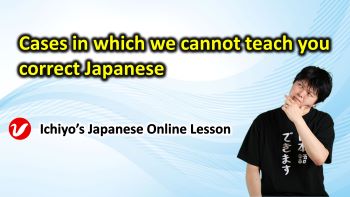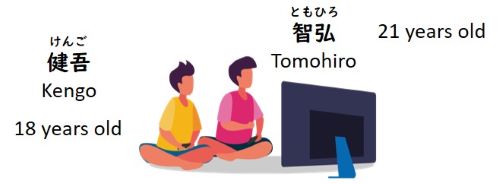
We offer conversation lessons and “Daily Japanese Mail Support .” In the “Daily Japanese Mail Support” service, we check and correct the members’ Japanese every time.
Our Japanese lesson: Ichiyo’s Japanese Online Lesson
However, there are cases in which we cannot teach them correct Japanese. Please read this page to understand the cases.
We need to know the situation and who are involved

When we check your Japanese, we need to know the situation and who are involved. If we do not know these information, we may teach you incorrect Japanese. We will show you some examples.
Mail support feedback about the phrase “That’s right” in Japanese
Please check my Japanese sentence. I want to say “That’s right.” The situation is talking with a friend of the same age.
My Japanese sentence: そうだよ。
Our feedback:
Your Japanese is correct! If you send the audio recording, we’ll also check your pronunciation.
*Age is the key point to teaching you correct Japanese.
Please check my Japanese sentence. I want to say “That’s right.” The situation is talking with my teacher in my school.
My Japanese sentence: そうだよ。
Our feedback:
It’s correct when we speak in a non-honorific language. However, it becomes rude in this situation. Please use「そうです。」It’s the polite form.
Please check my Japanese sentence. I want to say “That’s right.” The situation is talking with a customer in my office.
My Japanese sentence: そうだよ。
Our feedback:
「そうだよ。」becomes extremely rude in this situation. It’s used when we speak in a non-honorific language. Please use「左様でございます。」. This a suitable phrase for business. If you have a close relationship with the customer, you may use「そうですね。」depending on the situation.
These three examples are about「そうだよ。」. However, the content of our feedback is different depending on the situation. Without knowing the situation and who the member wants to use the phrase with, he/she may keep using rude Japanese.

Mail support feedback about the situation when we would like to request water
Please check my Japanese sentence. I want to say “Can I have a glass of water?” The situation is talking to my son.
My Japanese sentence: 水を一杯下さい。
Our feedback:
It’s grammatically correct but it’s strange Japanese. This is because your sentence is in an honorific-language. When we talk with our family, we do not use honorific language.
This is the natural Japanese sentence: 水を一杯ちょうだい。(Non-honorific)
| Key Word | 水 | 一杯 | ~をちょうだい |
| Hiragana | みず | いっぱい | ~をちょうだい |
| Romaji Reading | mizu | ippai | ~ o chōdai |
| English Meaning | water | a cup of | give me ~ (Non-honorific) |
Please check my Japanese sentence. The situation is that I visited a company and an employee asked me “Would you like water or tea?” I wanted to say “Can I have some water, please?
My Japanese sentence: 水を一杯下さい。
Our feedback:
It’s grammatically correct. However, we recommend you using this phrase:
では、水を一杯いただけますか。(More polite)
This is more polite and natural in this situation.「では」 means “then,” “well,” or “so.”
We need to know your age and the age of the person you are talking with
Age is very important in speaking correct Japanese.

Tomohiro and Kengo have been getting along well for a long time. They hang out almost every day. Kengo is younger than Tomohiro so Tomohiro can use non-honorific language to Kengo. On the other hand, Kengo must use honorific language to Tomohiro. If Kengo uses non-honorific language to Tomohiro, Kengo will be rude to him.
Do you know what to call their relationship? If you are an English speaker, you may think that their relationship is called “friend.” However, it is not the perfect answer in Japanese. The relationship is called「先輩後輩」. It is a unique Japanese hierarchical relationship. In this case, Kengo is Tomohiro’s「後輩」. Tomohiro is Kengo’s「先輩」. Kengo is below Tomohiro in the hierarchy due to his age.
Therefore, please tell us your age and the age of the person you are talking with when we check your Japanese.
When you do not know the person’s age

What should I do when I don’t know the person’s age?
It is recommended that you use honorific language when you do not know the person well. However, there are exceptions. If you are 30 years old and you are talking to a kid who is seven years old, you can use non-honorific language.
From a member:
Please check my Japanese sentence. I wanted to ask “Do you need cream for your coffee?” The situation is that I’m 34 years old and working at a café. I talked to a customer who looked like a teenager.
My Japanese sentence: コーヒーにミルクを付ける?
Our feedback:
Your Japanese sentence is grammatically correct but it becomes rude in this situation even though the customer looks younger than you. This is because you are in a business situation. In business, we usually use honorific language.
The suitable sentence: コーヒーにミルクをお付けしますか。
More polite: コーヒーにミルクをお付けいたしますか。
However, if you have a close relationship with the customer, like a friend, you may use non-honorific language.
From a member:
Please check my Japanese sentence. I want to ask “Did you get separated from your mom?” The situation is that I’m 24 years old and have found a lost child. I would like to talk to him. Can I use non-honorific language to talk to him?
My Japanese sentence: ママとはぐれちゃったの?
Our feedback:
Your Japanese is correct and you can use non-honorific language in this case.
*The reason is that this is not a business situation and the person is a child younger than the member.
Please write the situation and your age when we check your Japanese.
When you do not want to tell us your age
If we know the situation, your age, and the age of the person you are talking with, we can teach you correct Japanese. However, if you do not want to tell us your age, please write the situation as follows…
・The person looks 5 years younger than me.
・The person looks about 10 years older than me.
・The person is a kid and I’m an adult.
・I’m in my 30s and the person looks like a teenager.
Please write the English meaning of your Japanese
When you use our mail support, please write the English meaning of your Japanese. Sometimes we cannot understand what members want to say in Japanese.
Please check my Japanese sentence. I want to say it to my Japanese friend of the same age.
My Japanese sentence: 今日はスパゲッティが食べたい。
We replied to the message “Your Japanese is correct!”
The sentence means “I want to eat spaghetti today.” However, the member actually wanted to say “I ate spaghetti today.” We sent the wrong feedback to the member due to the lack of the English meaning.
Key points
To teach you correct Japanese when we check your Japanese in our lessons and mail support…
・Please tell us the situation when you use Japanese.
・ Please tell us about the person you are talking with.
・Please tell us your age and the age of the person you are talking with.
・Please write the English meaning of your Japanese.
We are looking forward to checking your Japanese in our private conversation lessons and our “Daily Japanese Mail Support”!

